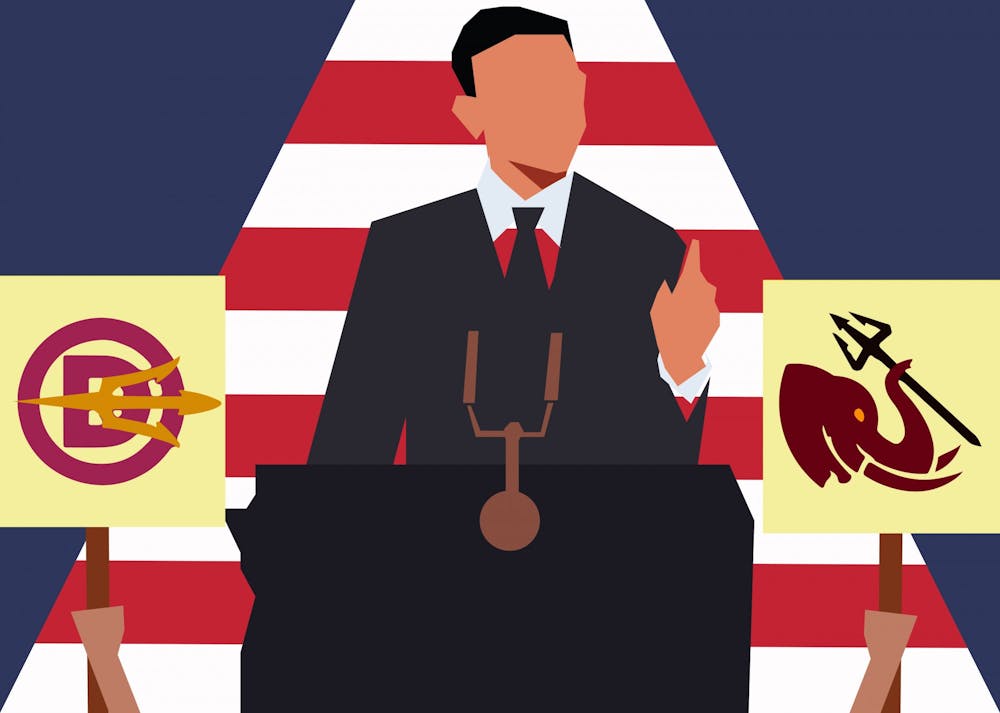As midterm election season approaches, ASU Young Democrats and ASU College Republicans are not endorsing primary candidates in an effort to maintain cohesion within their ranks.
Throughout the semester, both organizations have invited candidates vying for different positions to speak to students. Yet, the clubs are choosing to maintain their long-standing policy of neutrality in primary elections.
The organizations do this in an effort to not cause indecision within the organization if members are split on who to endorse and stand in the way of their November goals by potentially endorsing a candidate who doesn't win the primary.
Clay Robinson, vice president of College Republicans, said in an email, "Our primary-neutral policy is a constitutional provision that was implemented long before my time."
This policy is alluded to in Article II of the club's constitution, that states the club's mission is to "support the platforms, issues and candidates of the Republican Party" so as to "help in the election of Republican candidates to public offices in the State of Arizona, the United States Congress and the Executive Branch of the United States."
"The primary aim of College Republicans at ASU is to grow a big-tent party on campus and by endorsing in the primary elections, we stand the possibility of isolating students who may support another candidate," Robinson said in the email.
Robinson, a junior studying civic and economic thought and leadership, innovation in society, and political science, said in the email the focus on intra-party unity is driven by another foundational mission of his club, which is "not to divide but unite, which is what we do when we hit the ground running to elect Republicans up and down the ballot during general election cycles," Robinson said in the email.
The ASU Young Democrats club constitution does not outline specific policies regarding local, state or national elections, but the club has held a stance of neutrality for primary candidates for many years.
President of Young Democrats Sahara Sajjadiankhah echoed sentiments similar to those of her Republican counterpart.
"Endorsing candidates as a club can also make members feel isolated and unwelcome, as our club is meant to serve as a safe space for all democrats," said Sajjadiankhah, a junior studying political science, in an email. "Staying out of primaries allows for members to support their own candidates without feeling pressured by us."
Terence Chau, a senior studying sociology and an active member of College Republicans, said in an email it is to the club's advantage to stay unbiased in primary elections as they "unify as College Republicans, not students for certain candidates."
"We would host candidates as speakers in order to inform our fellow members," Chau said in an email. "But each of us has unique perspectives and preferences on the Republicans. Thus, we never endorse any candidates as a club. I think that's the beauty of this community."
These dual policies also keep the organizations from endorsing a candidate who loses the primary.
Sajjadiankhah said in an email "(it) prevents politics from getting too messy, say if we endorse someone, they lose, and now there is a strain between the candidate we did not endorse and our club."
Neither club is looking to change its neutrality policy anytime soon. Both clubs are intent on ensuring cohesion and a single-minded focus on winning elections rather than taking the risk of becoming bogged down in endorsing a candidate in the primaries.
Robinson said in an email "at this time, there are no considerations to repeal our primary-neutral constitutional provision."
Yet, Young Democrats is open to a possible change in the future.
"There is always room for growth and change, and if there is a race we deem necessary to endorse, there is a possibility we would endorse the candidate as a club," Sajjadiankhah said in an email.
Reach the reporter at mhabelt@asu.edu and follow @mhabelt21 on Twitter.
Like The State Press on Facebook and follow @statepress on Twitter.

Mark Habelt covers all-things politics in the ASU and Tempe communities. He can be reached any time at mhabelt@asu.edu. Please refer comments, questions, or story ideas to this email address, as Mark is always interested in discussing local issues.




